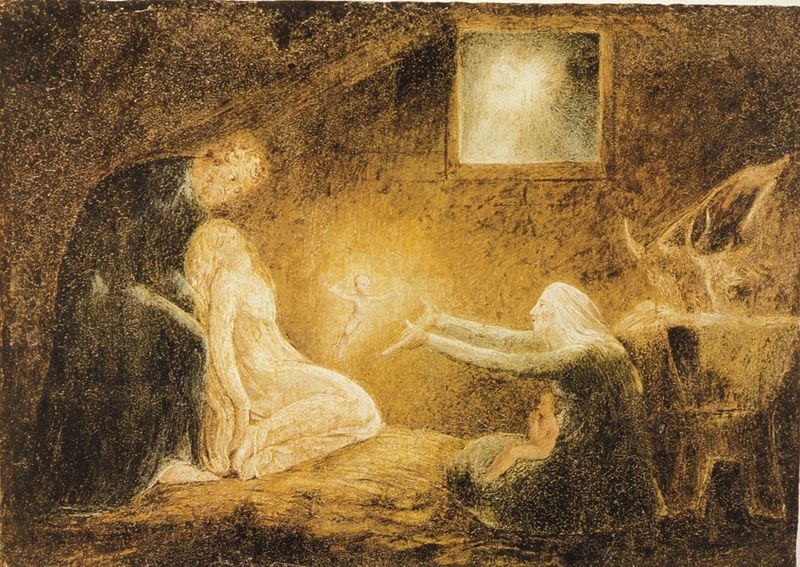This poem is from the Pickering Manuscript and probably dates from 1801-1804.
There are four previous posts on The Mental Traveller.
10)
"They are his meat, they are his drink:
He feeds the beggar and the poor
And the wayfaring traveller;
For ever open is his door."
Letter 12, (E 709)
"To my dear Friend Mrs Anna Flaxman
...The Bread of sweet Thought & the Wine of Delight
Feeds the Village of Felpham by day & by night
And at his own door the blessd Hermit does stand
Dispensing Unceasing to all the whole Land"
W. BLAKE
It is better to give than to receive. Even in old age the gathered riches can feed those who are less rich. But notice that the 'traveller' comes to the open door also. Who is this traveller? He is the man who is pursuing his own spiritual development, who has started out on the journey with the intention of seeking truth or wisdom or virtue, or vision, or consciousness. He is anxious to find the wisdom of the sage whose own life is fading.
Because the old man is giving, his strength is not depleted but renewed.

11)
"His grief is their eternal joy,
They make the roofs and walls to ring—
Till from the fire on the hearth
A little female babe does spring!"
We started with the woman old but we didn't follow her beyond the point where the boy reached maturity. Now we have the reappearance of the female in the form of a babe. Her arrival is in the midst of joy in Eternity and joy within. She explodes like a phoenix from the fire.
The male babe was born in joy; this female child springs onto the scene unconnected to any parents. In Blake's mythology the emanations are not born but separate from their male counterparts. Like many Greek gods and goddesses the female babe arrives on the scene in an unorthodox way. This is a reminder that what the poem speaks of are mental events (not of this world) whether on the psychological, spiritual or historical level. The meaning has to be uncovered; it will not be found on the surface.
The appearance of the female babe is a point of crisis: threat or opportunity. Will she become Vala or Jerusalem?
A way to put a positive spin on this verse is as follows:
His grief is suffering he willingly endures for the sake of others. Their eternal joy is what they experience as they apply his teaching and benefit eternally. The enclosing structure is filled with music and laughter. Conditions are met for a further stage of development. The babe that is produced from the fire (the way forward), is unlike the man in whose home she is produced.
12)
"And she is all of solid fire
And gems and gold, that none his hand
Dares stretch to touch her baby form,
Or wrap her in his swaddling-band."
The image of the solid fire brings to my mind the hot coals in a fire or a furnace. Within the coals is stored heat of combustion which will be radiated as cooling takes place. George McDonald (The Princess and Curdie and The Princess and the Goblin ) had a character who was asked to place his hands in such a bed of glowing embers and who received gifts by doing so.
But none will dare to reach out and touch this child or wrap her as the Christ child was wrapped. This development in the psyche will not be easy to assimilate. In Gates of Paradise, the process of spiritual development is begun by the infant who is wrapped in the swaddling-bands of a chrysalis.
There are at least two words in this verse which suggest the material nature of this babe: 'solid' and 'form'. This verse could represent either the separation into spirit and substance, or the possibility of the integration of the two into one.
Milton Percival in his Circle of Destiny quoted Franz Hartman as follows (p. 91): "Woman as such represents the will (including love and desire), and man as such represents intellect (including the imagination). Woman represents substance; man represents spirit. Man imagines; woman executes. Man creates images; woman renders them substantial."
The rational processing of man (Urizen) and the body (Tharmas) which is the vehicle for expression, are in constant tension. Tharmas may be something of a gatekeeper for allowing ideas to become materialized.
A period of calm, of integration, of assimilation has been interrupted by the unexpected appearance of new entity rising from the flames of energy, desire and illumination. There was a release of energy in the birth of the babe; another in the unbinding of the youth; and a third here in the springing forth of this glowing golden feminine form.
No comments:
Post a Comment